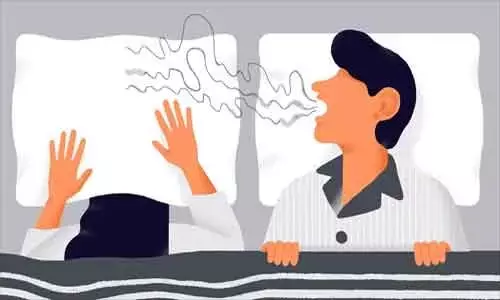- Home
- Medical news & Guidelines
- Anesthesiology
- Cardiology and CTVS
- Critical Care
- Dentistry
- Dermatology
- Diabetes and Endocrinology
- ENT
- Gastroenterology
- Medicine
- Nephrology
- Neurology
- Obstretics-Gynaecology
- Oncology
- Ophthalmology
- Orthopaedics
- Pediatrics-Neonatology
- Psychiatry
- Pulmonology
- Radiology
- Surgery
- Urology
- Laboratory Medicine
- Diet
- Nursing
- Paramedical
- Physiotherapy
- Health news
- Fact Check
- Bone Health Fact Check
- Brain Health Fact Check
- Cancer Related Fact Check
- Child Care Fact Check
- Dental and oral health fact check
- Diabetes and metabolic health fact check
- Diet and Nutrition Fact Check
- Eye and ENT Care Fact Check
- Fitness fact check
- Gut health fact check
- Heart health fact check
- Kidney health fact check
- Medical education fact check
- Men's health fact check
- Respiratory fact check
- Skin and hair care fact check
- Vaccine and Immunization fact check
- Women's health fact check
- AYUSH
- State News
- Andaman and Nicobar Islands
- Andhra Pradesh
- Arunachal Pradesh
- Assam
- Bihar
- Chandigarh
- Chattisgarh
- Dadra and Nagar Haveli
- Daman and Diu
- Delhi
- Goa
- Gujarat
- Haryana
- Himachal Pradesh
- Jammu & Kashmir
- Jharkhand
- Karnataka
- Kerala
- Ladakh
- Lakshadweep
- Madhya Pradesh
- Maharashtra
- Manipur
- Meghalaya
- Mizoram
- Nagaland
- Odisha
- Puducherry
- Punjab
- Rajasthan
- Sikkim
- Tamil Nadu
- Telangana
- Tripura
- Uttar Pradesh
- Uttrakhand
- West Bengal
- Medical Education
- Industry
Habitual snoring linked to increased asthma symptom burden, Study says

According to recent research, it has been found out that snoring is common among inner-city school-age children with asthma, and habitual snoring is associated with increased asthma symptom burden and health care utilization.
The study is published in the Journal of Allergy and Clinical Immunology.
Inner-city children are disproportionately affected by asthma and sleep-disordered breathing (SDB). However, little is known about the association of SDB symptoms with asthma morbidity in this vulnerable population.
Therefore, Sigfus Gunnlaugsson and colleagues from the Division of Pulmonary Medicine, Boston Children's Hospital, Harvard Medical School, Boston, Mass carried out the present study with the objective to assess the relationship between snoring frequency and asthma morbidity.
This study was part of the School Inner-City Asthma Study, a longitudinal prospective cohort study of children with persistent asthma who attended schools in the Northeast United States. Participants had baseline assessments of asthma symptoms, snoring, and allergy status.
Caregivers completed quarterly surveys for 12 months on symptoms of asthma, snoring, and health care outcomes. Snoring frequency (non-, rare-, sometimes-, habitual-snoring) and its relationship with asthma symptoms and asthma morbidity were assessed by mixed-effects models.
The following findings were observed-
a. There were 1186 observations from 339 subjects.
b. Mean age was 7.9 years; roughly half were male, and most were of minority race.
c. Half were overweight or obese, and 65.5% had atopy.
d. At initial snoring assessment, 24.8% reported habitual snoring, but report of snoring frequency varied over the study period.
e. Multivariate analyses revealed increased odds of maximum asthma symptom days for habitual snoring compared with nonsnoring (1.58; 95% CI, 1.19-2.10; P < .002) and all other snoring categories. f. Habitual snoring was associated with greater odds of health care utilization (incidence rate ratio, 1.72; 95% CI, 1.10-2.69; P = .02) and worse asthma control (odds ratio, 1.49; 95% CI, 1.05-2.11; P = .03) compared with nonsnoring.
Hence, the authors concluded that "snoring is common among inner-city school-age children with asthma, and habitual snoring is associated with increased asthma symptom burden and health care utilization."
Dr. Nandita Mohan is a practicing pediatric dentist with more than 5 years of clinical work experience. Along with this, she is equally interested in keeping herself up to date about the latest developments in the field of medicine and dentistry which is the driving force for her to be in association with Medical Dialogues. She also has her name attached with many publications; both national and international. She has pursued her BDS from Rajiv Gandhi University of Health Sciences, Bangalore and later went to enter her dream specialty (MDS) in the Department of Pedodontics and Preventive Dentistry from Pt. B.D. Sharma University of Health Sciences. Through all the years of experience, her core interest in learning something new has never stopped. She can be contacted at editorial@medicaldialogues.in. Contact no. 011-43720751
Dr Kamal Kant Kohli-MBBS, DTCD- a chest specialist with more than 30 years of practice and a flair for writing clinical articles, Dr Kamal Kant Kohli joined Medical Dialogues as a Chief Editor of Medical News. Besides writing articles, as an editor, he proofreads and verifies all the medical content published on Medical Dialogues including those coming from journals, studies,medical conferences,guidelines etc. Email: drkohli@medicaldialogues.in. Contact no. 011-43720751


